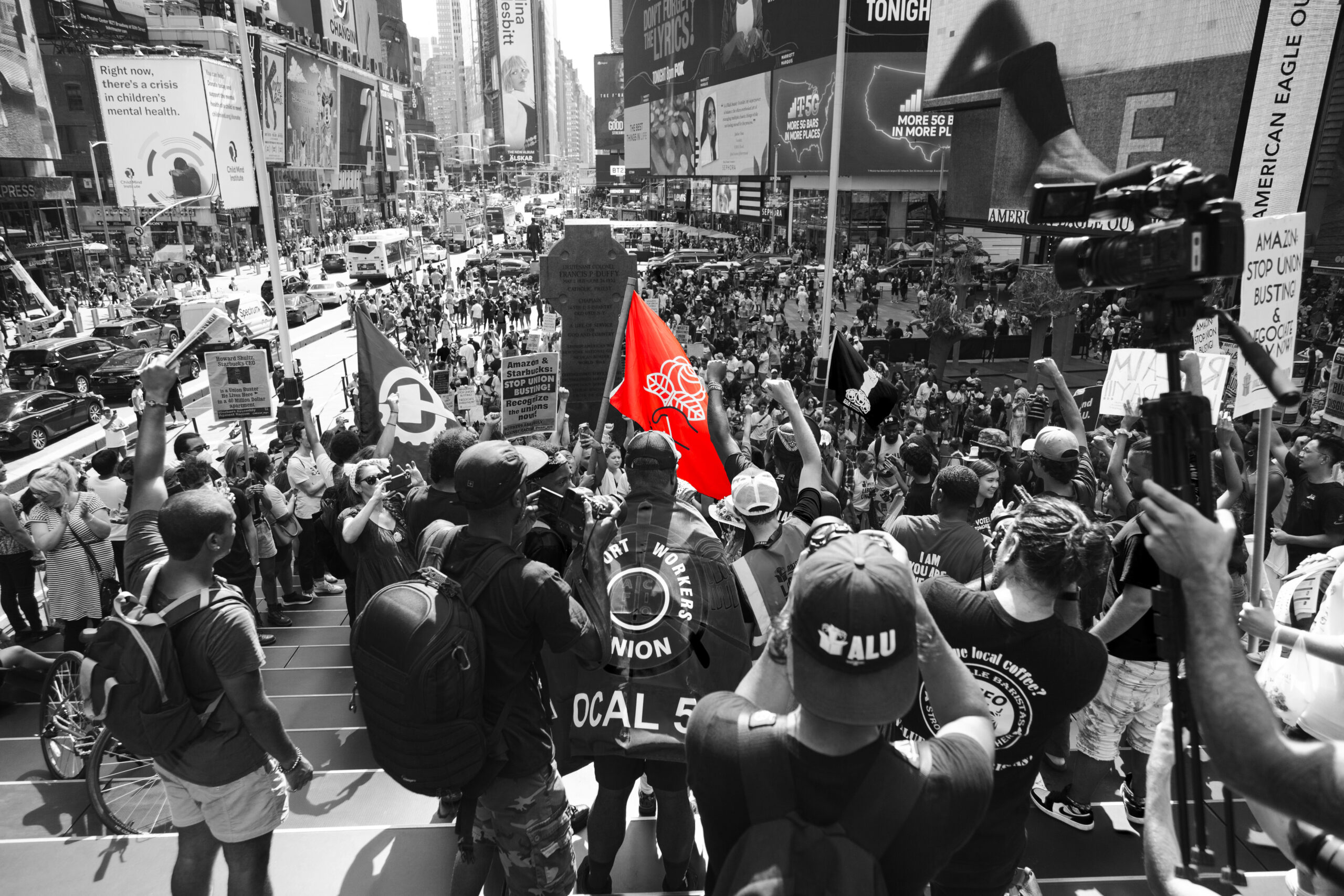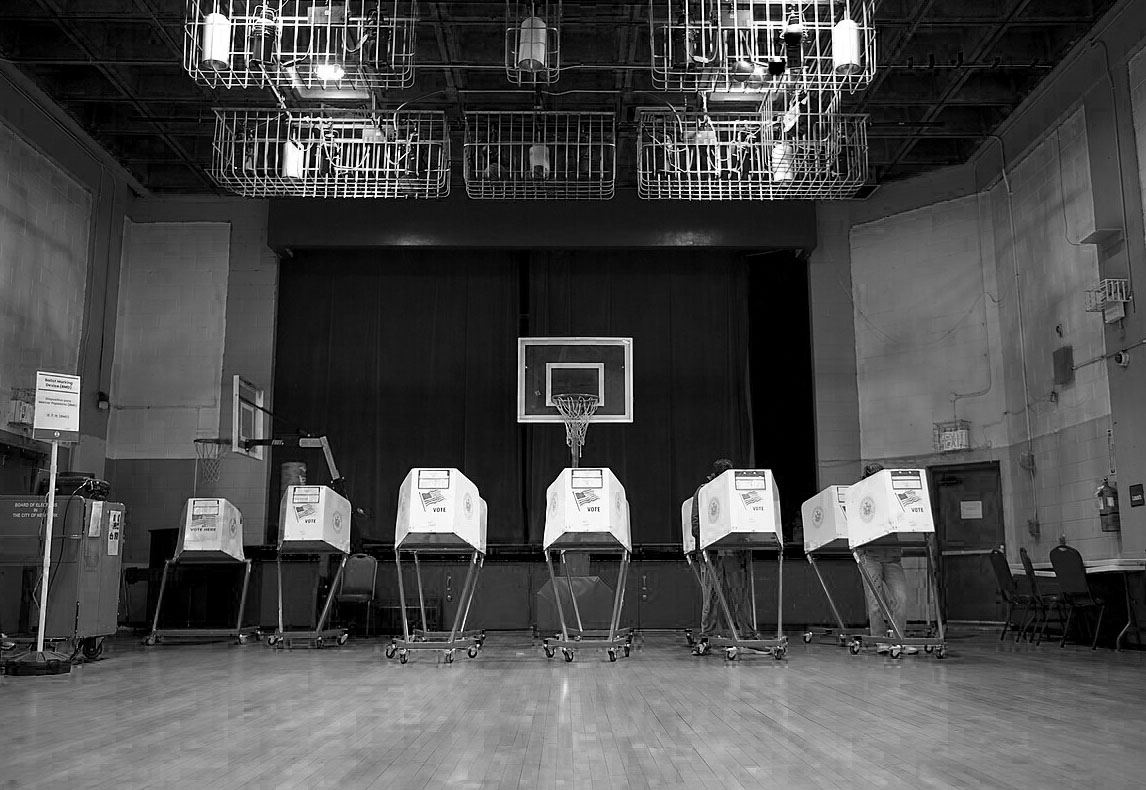Fall 2024
(Beyond) Elections
How do we put our faith in elections while the world around us falls apart? How do we build a new world through an electoral process that has failed us time and time again? What emergent struggles and classic texts should we use to guide our protests and movements? In this issue, we look at various strategies employed to build a socialist world from a wide range of perspectives. From drawing connections to the working-class struggle for democratic self-government to building an equal and democratic society, and from modern computation to Shawn Fain’s general strike to the role of DSA delegations abroad to the left’s analysis of our economic crisis, the authors in this issue of Socialist Forum reflect on these questions and provide some thoughtful analyses on the path forward towards a socialist future.
Luke Pickrell writes about the increased scrutiny over the American constitution. He argues that DSA, in response to Trump’s recent victory, must seize upon existing demands for real democracy by creating a “People’s Petition.” This petition would call for a constitutional convention and form a democratically elected constituent assembly to draft a new democratic constitution with features such as deciding presidential elections by popular vote, providing public financing for all elections, and abolishing the Electoral College.
In his piece, Samuel Withers addresses the issue of building socialism in the heart of empire with a focus on the unique conditions that have been its primary barriers. For one, he points to the current electoral system, which relies on a two-party system, which makes it impossible for socialists to achieve electoral victory. To build power, he writes, we must build coalitions among the left and participate in electoral work, propaganda campaigns, direct actions, outreach programs, and direct service work. The fundamental inability of ordinary citizens to enact change under the status quo must be the core focus of socialist propaganda.
Next, National Political Committee member Sam Heft-Luthy discusses the hidden histories of labor in modern computation. He argues that the transition from workshop production to heavy industry depicted in Marx’s Capital mirrors the governing logic of modern computation, which simultaneously facilitates and abstracts a huge number of human collaboration through spontaneous interactions in the market. This has led to the alienation of the working class as technologies like artificial intelligence are used to replace workers—even though many of those technologies rely heavily on exploiting human labor. Applying Marx’s critique of capital’s inner logic to our contemporary systems of production can reveal that the alienation of software and the alienation of capitalism are the same, reinforcing how Marx’s theories remain relevant to understanding our contemporary capitalist systems.
Socialist Forum editorial board member Todd Chretien sat down with director for UAW Region 9 Brandon Mancilla, vice president of the Chicago Teachers Union Jackson Potter, and Sarah Hurd, a co-chair of DSA’s National Labor Committee and an organizer with the Illinois Nurses Association, at the Socialism 2024 Conference in Chicago. They discussed UAW president Shawn Fain’s call for a general strike on May Day 2028 and the possibility of bringing the labor movement together to collectively push for both changes in working conditions and to get our political demands met. They also discuss how the Illinois Nurses Association and the Chicago Teachers Union (CTU) in Chicago are working on organizing to address their own labor issues and redistribute resources through their specific unions.
Paul Garver reflects on the lessons he’s accumulated through his experience with DSA delegation visits to foreign countries. Garver shares his personal experiences with solidarity delegations, including his involvement in Central American labor solidarity work during the 1980s. He emphasizes the need for a clearly defined mission and being flexible in meeting with a wide spectrum of people to gather information essential for meeting the intended objective. He also suggests that the experiences drawn from global labor solidarity organizing are applicable to DSA international work, as they emphasize the need for democratic socialism to include the ability of the working class to organize autonomously and function democratically without interference from any regime. Finally, he suggests that we learn from broad left movements in other countries that have demonstrated success in winning mass electoral support from the working class and other subordinate classes.
David Turner argues that the left’s economic messaging should focus on a holistic account of the working class’s economic woes while also challenging corporate price gouging, empowering workers, increasing taxes on the wealthy, and strengthening unions. Doing so presents a more nuanced and distinct explanation of what is causing inflation and economic anxiety over the rising cost of food and sets ourselves apart from the mainstream liberal media, which has tried to convince workers that things are better than they actually are.
Finally, Josue Cisneros reviews Vigilante Nation: How State-Sponsored Terror Threatens Our Democracy, by Jon Michaels and David Noll. Michaels and Noll examine how right wing political forces exploit the legal system to promote fascist politics. Cisneros praises the authors for their meticulous research but see their prescriptions to combat these efforts with more manuevering within legal institutions to be lacking and indicative of the primary distinction between liberal and socialist opposition to fascism. He emphasizes DSA’s own organizing and its 2024 political program, Workers Deserve More, as a more fruitful alternative.
These examples reveal the strategic importance of long-term, stable left organizations like the DSA pursuing long-term projects and programs and having avenues through which these lessons can be recorded and shared. To that end, Socialist Forum supports that project by sharing the work in this issue.
Image: Polling station in the Lincoln Square neighborhood of Manhattan, New York City. Cropped and edited from photo by SWinxy. Shared under the Creative Commons Attribution 4.0 International license.
Articles
-
The People’s Petition
Luke Pickrell and Harlei Morency
In response to Trump’s recent victory, DSA must seize upon existing demands for real democracy by creating a “People’s Petition.” This petition would call for a constitutional convention and form a democratically elected constituent assembly to draft a new democratic constitution with features such as deciding presidential elections by popular vote, providing public financing for all elections, and abolishing the Electoral College.
-
The American Road to Socialism
Samuel Withers
How do you build socialism in the heart of empire? What unique conditions have been socialism’s primary barriers in the United States? Samuel Withers points to the current electoral system, which relies on a two-party system, which makes it impossible for socialists to achieve electoral victory. To build power, he writes, we must build coalitions among the left and participate in electoral work, propaganda campaigns, direct actions, outreach programs, and direct service work. The fundamental inability of ordinary citizens to enact change under the status quo must be the core focus of socialist propaganda.
-
On the Commodity Fetish of Computation
Sam Heft-Luthy
The transition from workshop production to heavy industry depicted in Marx’s Capital mirrors the governing logic of modern computation. This has led to the alienation of the working class as technologies like artificial intelligence are used to replace workers—even though many of those technologies rely heavily on exploiting human labor. Applying Marx’s critique of capital’s inner logic to our contemporary systems of production can reveal that the alienation of software and the alienation of capitalism are the same, reinforcing how Marx’s theories remain relevant to understanding our contemporary capitalist systems.
-
From 2024 to 2028
Todd Chretien
An interview with director for UAW Region 9 Brandon Mancilla, vice president of the Chicago Teachers Union Jackson Potter, and Sarah Hurd, a co-chair of DSA’s National Labor Committee and an organizer with the Illinois Nurses Association, at the Socialism 2024 Conference in Chicago. They discussed UAW president Shawn Fain’s call for a general strike on May Day 2028, and how the Illinois Nurses Association and the Chicago Teachers Union (CTU) in Chicago are working on organizing to address their own labor issues and redistribute resources through their specific unions.
-
Studying Abroad
Paul Garver
International solidarity delegations need a clearly defined mission, and delegates should be flexible about meeting with a wide spectrum of people to gather information essential for meeting the intended objective. The experiences Paul Garver has drawn from global labor solidarity organizing emphasize the need for democratic socialism to include the ability of the working class to organize autonomously and function democratically without interference from any regime. We learn from broad left movements in other countries that have demonstrated success in winning mass electoral support from the working class and other subordinate classes.
-
Why Did the Left Misunderstand the Biden Economy?
David Turner
The left’s economic messaging should focus on a holistic account of the working class’s economic woes while also challenging corporate price gouging, empowering workers, increasing taxes on the wealthy, and strengthening unions. Doing so presents a more nuanced and distinct explanation of what is causing inflation and economic anxiety over the rising cost of food and sets ourselves apart from the mainstream liberal media, which has tried to convince workers that things are better than they actually are.
-
Book Review: Vigilante Nation – Jon Michaels and David Noll
Josue Cisneros
This new book by Jon Michaels and David Noll examines how right wing political forces exploit the legal system to promote fascist politics. Reviewer Josue Cisneros praises the authors for their meticulous research but see their prescriptions to combat these efforts with more manuevering within legal institutions to be lacking and indicative of the primary distinction between liberal and socialist opposition to fascism. He emphasizes DSA’s own organizing and its 2024 political program, Workers Deserve More, as a more fruitful alternative.

